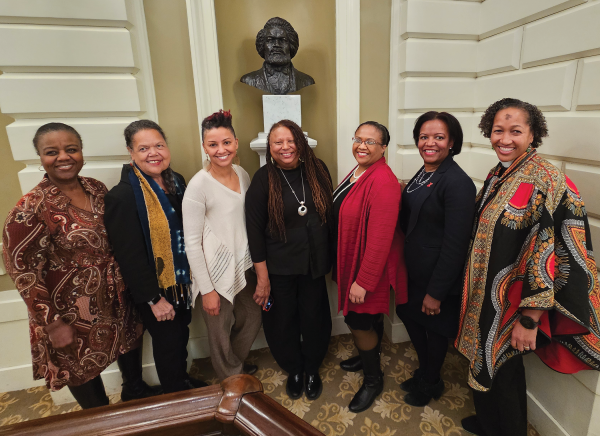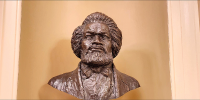February 21, 2024

On hand for the Douglass bust unveiling were former State Rep. Marie St. Fleur, Marita Rivero past director of Museum of African American History (MAAH), Dr. Karilyn Crockett, L’Merchie Frazier, Dr. Noelle Trent, the current president & CEO of MAAH, former State Senator Linda Dorcena Forry, and Rev. Mariama White Hammond, Chief of Environment, Energy and Open Space in Boston.

Nearly 130 years after abolitionist, orator, and newspaper publisher Frederick Douglass addressed state lawmakers, the Senate unveiled a bust in the branch’s chamber honoring his legacy during a ceremony last week.
Senate President Karen Spilka intentionally left two alcoves inside the chamber vacant in her quest to enhance the diverse representation of historical figures in the State House. The other empty alcove will eventually be filled with a bust of a woman, and Spilka has previously floated the idea of selecting Abigail Adams.
“My hope is that people will see the Senate recognizes Frederick Douglass as one of our founding fathers, basically laying a strong foundation, raising issues, fighting for civil justice, for civil rights and that his words and actions still are with us, still have to stay with us,” Spilka said an interview with the News Service. “They have to be forefront in our minds when we pass legislation.”
Douglass’s bust is situated somewhat near the Douglass quote painted on the chamber’s tympanum, which states, “Truth, justice, liberty, and humanity will ultimately prevail.”
It’s the first bust to be added to the Senate Chamber since 1898, as well as the first state-commissioned bust of a Black person in the State House, according to Spilka’s office. The Senate commissioned the bust for $7,000, a Spilka spokesperson said.
“We’re just really happy to see Frederick Douglass represented with a bust to go along with his quote,” Paula Morse, chair of the State House Art Commission, said. “I think it’s just wonderful that we are doing this, that when people come to the State House, from children all the way up to their great-grandparents, [they] can see people that look like them. We can’t remake the past but within the past, notable figures like Frederick Douglass belong here.”
Douglass’s great-great-great grandson said his family was “incredibly humbled” by the artwork.
When Douglass escaped slavery, he settled in New Bedford and spoke about his experiences across the country through the Massachusetts Anti-Slavery Society, according to the National Park Service. His first speech to a mostly white audience happened in August 1841, during an anti-slavery convention held in the Nantucket Atheneum’s Great Hall, according to a town document.
During the Civil War, two of Douglass’ sons served in the 54th Massachusetts Regiment, according to NPS.
“From New Bedford to Nantucket to Lynn, and many cities and towns in between, Massachusetts is where Frederick Douglass found freedom, raised his young family, and began to realize the power of his story and his voice,” Kenneth Morris Jr., president of Frederick Douglass Family Initiatives, said in a statement. “It’s also where Douglass found support from many fellow freedom fighters, and where he recruited his sons Charles Remond Douglass and Lewis Henry Douglass to serve in the Massachusetts 54th Infantry Regiment during the Civil War. We hope this bust, displayed in the Senate chamber together with Douglass’s words, will inspire all who are united in the quest for social justice, liberty and equality.”
Douglass spoke with House and Senate members during a visit to Beacon Hill on May 10, 1894. He previously came to the State House about five decades earlier, according to the Worcester Daily Spy.
“I have appeared before the American people in a number of qualities. Once as a slave, 56 years ago, I was seized with a strong desire to see Massachusetts, and came North with that end in view,” Douglass told the House before visiting the Senate, according to the Boston Daily Journal. “Again, I appeared as a fugitive slave and again as an advocate in behalf of the slave.”
“He has a lot of very close ties to Massachusetts, so we can call him our own,” Spilka said. “And it just feels that is so appropriate and overdue to have him in the Senate Chamber, along with some of the other prominent figures that we have there, as our founding fathers of Washington, and Lincoln, and Franklin and a few others that are in there. He’ll have his own resting place very comfortably.”
The public event coincided with Douglass’s birthday, and Feb. 14 is also recognized as Frederick Douglass Day in Massachusetts as a result of an amendment to the fiscal year 2020 budget bill first proposed by Sen. Mark Montigny, Spilka’s office said.
A different Frederick Douglass bust, loaned by Boston’s Museum of African American History, was previously displayed in the Senate Chamber after the space was renovated and reopened in 2019, a Spilka spokesperson said.
The new Douglass bust is a replica of a bust originally created by Massachusetts sculptor Lloyd Lillie and kept by his family, said State House art curator Susan Greendyke Lachevre.
“Their bust in their collection was sent to a foundry, and a mold was made. So it is a true copy of the one that Lloyd Lillie made, and it was cast by the foundry that he always used,” she said.
Spilka said she was struck by the dearth of diverse artwork at the state capitol, particularly featuring women and people of color, when she became Senate president.
“We have such a rich history, with women, with people of color and all of the contributions that all people, the diverse people, have made to our wonderful commonwealth,” Spilka said. “And it was astounding to me the lack of diversity here.”
Spilka said senators will start discussing which woman should be depicted in another new bust during Women’s History Month in March.
The State House’s limited diverse collection today includes portraits of influential Massachusetts women hanging in Spilka’s office, plus portraits of former Gov. Deval Patrick and Chief Justice Roderick Ireland, both of whom are Black. There are also reliefs of Sarah Parker Remond and Josephine St. Pierre Ruffin, two Black female leaders who knew Douglass, in Doric Hall, Greendyke Lachevre said.
The original Senate busts depict George Washington, Benjamin Franklin, Marquis de Lafayette, Abraham Lincoln, Charles Sumner, Henry Wilson, Gardiner Tufts, George Boutwell and Samuel Francis Smith, according to the State House Art Commission.
The Douglass bust is filling space previously occupied by Boutwell’s, Spilka’s office said.
Greendyke Lachevre said Douglass belongs with the other distinguished honorees.
“It’s a step in the right direction to broaden the representation of the people who are honored in the State House,” Greendyke Lachevre said. “We even have this encouragement in our acquisition guidelines that people consider broadening their thoughts and their ideas of who to honor in the building by recognizing underrepresented communities, groups, people in the collection.”
State House News Service’s Sam Doran contributed to this story.


